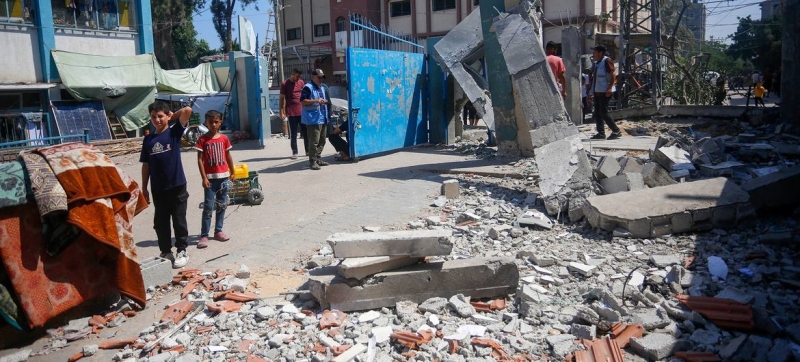
Destruction in central Gaza after a school attack (archive). War in Gaza: attacks on schools and murders of journalists Peace and Security
At least 163 Palestinians, including children, were reportedly killed in attacks on 17 schools in Gaza last month. The UN Human Rights Office (OHCHR) said the nature of the attacks showed a failure by Israeli forces to respect the principles of distinction, proportionality and precaution.
Humanitarian obligations
At least seven schools have been hit in the past eight days, the OHCHR said. The schools were reportedly being used as shelters for internally displaced persons, while one also served as a field hospital. The Israeli military claims that the schools were occupied by Hamas militants.
The use of civilian-populated areas by armed groups or the use of civilians for protective purposes constitute violations of international humanitarian law, but this does not change Israel’s obligation to strictly observe the principles of proportionality, distinction and precaution in its military operations, the UN Office noted. Israel, as an occupying power, is also obliged to provide the basic needs of the evacuated population, including safe shelter.
Violence in the West Bank
The OHCHR also expressed concern about the use of lethal force by Israeli security forces in the West Bank, where nine Palestinians were reportedly killed on 3 August. Five of these cases appeared to be planned extrajudicial executions.
Read also:
UN human rights chief: Regional conflict in Middle East must not be allowed to escalate
The planned killing of individuals who do not pose an immediate threat to life, as well as the regular use of military tactics and live-fire weapons in law enforcement operations in the occupied West Bank, raise concerns about the unjustified or disproportionate and unlawful use of force, according to the OHCHR statement.
The UN Office added that on August 4, a Palestinian from the occupied West Bank reportedly stabbed and killed two Israelis and wounded two others in Holon, Tel Aviv, after he illegally crossed the border into Israel. Israeli security forces reportedly shot dead the attacker at the scene.
Killings of journalists
Meanwhile, the UN Special Rapporteur on the right to freedom of opinion and expression Irene Khan on Tuesday condemned the killings of Al Jazeera journalist Ismail al-Ghoul and cameraman Rami al-Rifi in Gaza on August 1 this year.
“Like many journalists killed in Gaza, al-Ghoul was wearing a jacket with clear press insignia when his car was hit by an Israeli drone strike. The Israeli military confirmed al-Ghoul’s death and accused him of being a Hamas militant,” the UN independent expert said.
She noted that journalists are protected under international humanitarian law and that deliberately targeting them is a war crime. Under international law, journalists only lose their civilian status if they take a direct part in hostilities. Israel has not provided concrete evidence in this or any other cases of media deaths, the Special Rapporteur said in a statement.
Khan also condemned Al Jazeera’s persecution in Israel, including the targeted killing of its journalists in Gaza, a blanket ban on the media outlet and a “smear campaign” against the broadcaster. According to her, this is an attack on media freedom and a disregard for human rights and humanitarian law.
Lack of investigation
The expert also expressed serious concern that not a single case of murder of journalists in the Occupied Palestinian Territory has been transparently investigated, and the suspects were not brought to justice.
“I again call on the Israeli authorities to launch a prompt, thorough, independent and impartial investigation into this and other killings and take all necessary measures to protect journalists in the Occupied Palestinian Territory in accordance with international humanitarian and human rights law,” Khan said.
She also called on the International Criminal Court to take immediate action to prosecute the killings of journalists in Gaza as a war crime in the face of Israeli inaction.
Special Rapporteurs are part of the so-called Special Procedures of the Human Rights Council. They are not UN employees and are not dependent on any government or organization. They work in a personal capacity and are not paid for their work.
